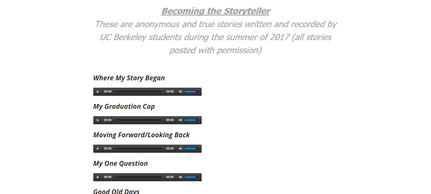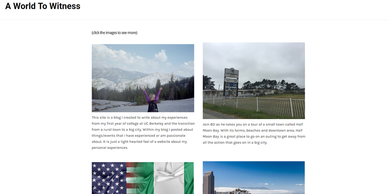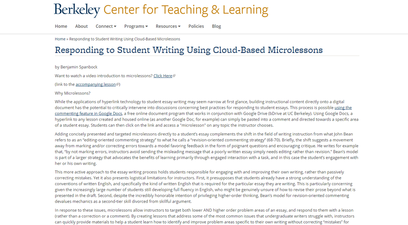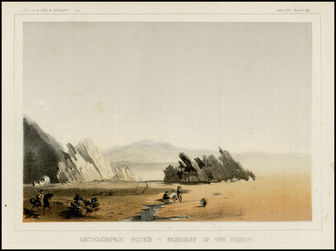This portfolio contains a variety of projects related to writing, expression, and digital publication that I've collected together. I want to thank my students in particular for giving permission to show their work here, and for all their effort and passion over the years. This site belongs as much to them as it does to me.
|
"Culture Blogs" Multimodal student projects created on Tumblr
|
|
Conference talks and slides
|
Doctoral Research (2010-2013)
|
Summer 2015
Click here to see the slides from my presentation at the 2015 Computers and Writing Conference at University of Wisconsin, Stout.
Spring 2015
|
|
Check out this video discussing my use of "microlessons" to provide feedback on student writing! You can read the entire discussion as published on the UC, Berkeley Center for Teaching and Learning Website here |
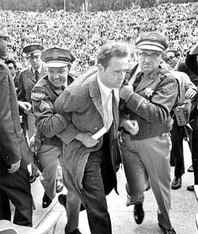
Fall 2014
This semester, students in my classes will participate in the U.C. Berkeley "On The Same Page" program. The program brings together students across campus by encouraging classrooms to teach from the same book. This year's book is Freedom's Orator by Robert Cohen. It is a smart biographical account of political activist Mario Savio that also collects together many of the most important original documents related to his life and involvement in the student movement of the 1960s.
This semester, students in my classes will participate in the U.C. Berkeley "On The Same Page" program. The program brings together students across campus by encouraging classrooms to teach from the same book. This year's book is Freedom's Orator by Robert Cohen. It is a smart biographical account of political activist Mario Savio that also collects together many of the most important original documents related to his life and involvement in the student movement of the 1960s.
Fall/Spring 2014
As a member of the Lecturer Teaching Fellows Program for the 2014/15 academic year, I will be working on a project titled The Physical Classroom in the Digital Age: Exploring Possibilities and Redefining Value. The position is sponsored by the U.C. Berkeley Center for Teaching and Learning. Please check back soon for more info and updates!
As a member of the Lecturer Teaching Fellows Program for the 2014/15 academic year, I will be working on a project titled The Physical Classroom in the Digital Age: Exploring Possibilities and Redefining Value. The position is sponsored by the U.C. Berkeley Center for Teaching and Learning. Please check back soon for more info and updates!
Doctoral Research (2010-2013):
Click here to read Chapter One, on the various English language translations of Cabeza de Vaca's colonial narrative Naufragios.
(Please use contact form for permissions, use requests or bibliographic inquiries)
Here is a description of my doctoral dissertation "Transfrontera Translations: Language, History, and Culture in the U.S./Mexican Borderlands" taken from the abstract:
The U.S./Mexican borderlands are a region where people, cultures, and ideologies meet, integrate, coexist, and clash. These varied encounters happen against a background of economic inequality, national divisions, deeply embedded racial stereotypes, and linguistic difference. It is therefore the case that constant acts of translation are necessary to navigate the borderlands’ unique and uneven social landscape. The premise of this work is that translation in the borderlands bridges disjunctures not only between languages, but also between bordering and converging cultural, political, and national bodies. In this way, translation is essential to the exposition and negotiation of difference. Yet translation is also a subjective practice, with meaning simultaneously lost and made in the process. This makes difference difficult to fully reconcile and acts of translation import to examine. Since the disjunctures bridged by translation often go either ignored (in cases when translations are erroneously thought to provide unmediated access to the original) or met with fear, resistance, or aggression towards the other (in cases when the need for translation is abandoned in favor of perpetuating difference) the imperative for a sustained investigation into the methodologies that guide translation in the borderlands rests in a need for improving understanding and assuaging violence.
The U.S./Mexican borderlands are a region where people, cultures, and ideologies meet, integrate, coexist, and clash. These varied encounters happen against a background of economic inequality, national divisions, deeply embedded racial stereotypes, and linguistic difference. It is therefore the case that constant acts of translation are necessary to navigate the borderlands’ unique and uneven social landscape. The premise of this work is that translation in the borderlands bridges disjunctures not only between languages, but also between bordering and converging cultural, political, and national bodies. In this way, translation is essential to the exposition and negotiation of difference. Yet translation is also a subjective practice, with meaning simultaneously lost and made in the process. This makes difference difficult to fully reconcile and acts of translation import to examine. Since the disjunctures bridged by translation often go either ignored (in cases when translations are erroneously thought to provide unmediated access to the original) or met with fear, resistance, or aggression towards the other (in cases when the need for translation is abandoned in favor of perpetuating difference) the imperative for a sustained investigation into the methodologies that guide translation in the borderlands rests in a need for improving understanding and assuaging violence.
